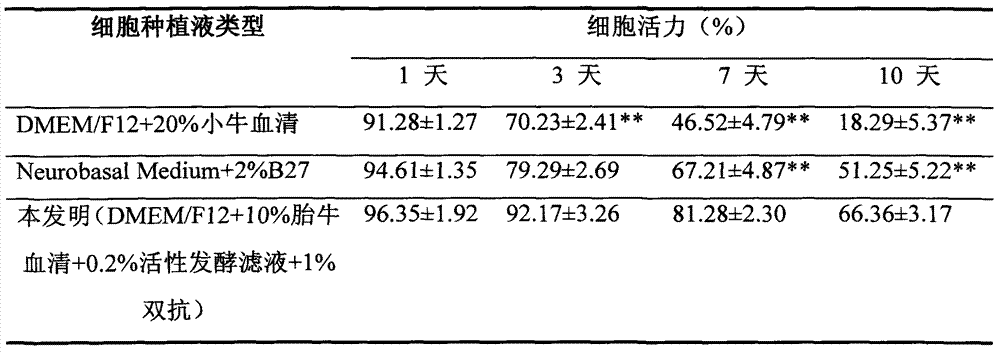Method for efficiently separating and culturing hippocampal neurons
A technology of hippocampal neurons and hippocampus, applied in the biological field, can solve the problems of easy increase of bacterial contamination, lack of suitable, difficult to obtain, etc., to achieve the effect of improving in vitro survival rate, improving digestion efficiency, and increasing physiological respiration
- Summary
- Abstract
- Description
- Claims
- Application Information
AI Technical Summary
Problems solved by technology
Method used
Image
Examples
Embodiment 1
[0042] Bifidobacterium breve (Bifidobac terium breve) LJM-006 of the present invention, already on October 28, 2011 in China Microorganism Culture Collection Management Committee General Microorganism Center, its abbreviation is CGMCC (Address: Beichen West Road, Chaoyang District, Beijing No. 1 Courtyard No. 3 Institute of Microbiology, Chinese Academy of Sciences, Zip Code 100101) is preserved, the classification is named Bifidobacterium breve (Bifidobac terium breve), and the preservation number is CGMCC No.5418.
[0043] The Bifidobacterium breve LJM-006 of the present invention was isolated from the feces of a healthy young man in Zhejiang Province.
[0044] Bifidobacterium breve LJM-006 bacterial strain of the present invention has following microbiological characteristics:
[0045] (1) Colony morphology: the colony of Bifidobacterium breve LJM-006 strain on the plate is off-white or milky white, opaque, shiny, smooth, raised, soft in texture, with neat edges, and 1-1.5 ...
Embodiment 2
[0052] Reagent purchase:
[0053] DMEM / F12 nerve basal medium, Neurobasal medium and B27 were purchased from Gibco; polylysine, fetal bovine serum (FBS), trehalose and L-glutamine were purchased from Sigma, USA; mixed with penicillin and streptomycin Solution (double antibody) was purchased from HyClone Company in the United States.
[0054] Reagent configuration:
[0055] (1) The D-Hank's solution is obtained through the following steps: NaCl8.0g, KCl0.4g, NaCl 2 HPO 4 12H 2 O0.12g, KH 2 PO 4 0.06g, NaHCO 3 0.35g; Dissolve each component in approximately 500mL triple-distilled water and mix well, add triple-distilled water to make up to 1000mL, adjust the pH value to 7.2-7.4, subpackage, autoclave, subpackage, and store at 4°C for later use.
[0056] (2) The rinse liquid is obtained through the following steps: dissolve 2g trehalose, 3g glucose and 10mL double antibody in 100mL D-Hank's solution, mix well, add D-Hank's solution to 1000mL, 0.4 Dissolve in hydrogen gas ...
Embodiment 3
[0067] The method for separating and primary culture of SD rat hippocampal neurons comprises the following steps:
[0068] Use the reagents prepared in Example 1 and Example 2 and configure the reagents.
[0069] (1) Rinsing: Take the hippocampus tissue of the isolated mammal, put it in the rinsing solution in an ice bath, and remove the red blood cells, capsule and conjunctiva.
[0070] For connective tissue, rinse 2 to 5 times with rinse solution;
[0071] (2) Digestion: cut the hippocampal tissue rinsed in step 1 into a diameter of 1mm 3 For small pieces, use 5 times the tissue volume of digestion solution at 37°C for 5-10 minutes to organize into a porridge-like shape, stop digestion with cell seeding solution, and gently pipette until the tissue piece is 10 times to disperse the cells.
[0072] (3) Preparation of cell suspension: Collect the initial cell suspension after digestion in step 2, filter through a 200-mesh cell sieve, centrifuge at 800-1000 rpm at 4°C for 5-10 ...
PUM
 Login to View More
Login to View More Abstract
Description
Claims
Application Information
 Login to View More
Login to View More - R&D
- Intellectual Property
- Life Sciences
- Materials
- Tech Scout
- Unparalleled Data Quality
- Higher Quality Content
- 60% Fewer Hallucinations
Browse by: Latest US Patents, China's latest patents, Technical Efficacy Thesaurus, Application Domain, Technology Topic, Popular Technical Reports.
© 2025 PatSnap. All rights reserved.Legal|Privacy policy|Modern Slavery Act Transparency Statement|Sitemap|About US| Contact US: help@patsnap.com

